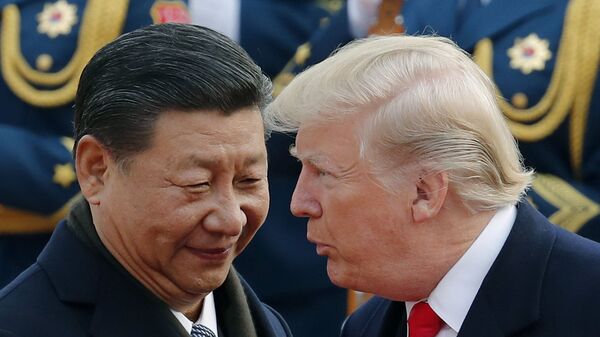US President Donald Trump tweeted Wednesday that the promised tariff hike on $250 billion worth of Chinese goods will be postponed from October 1 to October 15 as a “gesture of good will” due “to the fact that the People’s Republic of China will be celebrating their 70th anniversary on October 1.”
On Friday, Beijing responded by stating that the “Customs Tariff Commission of the State Council will exclude some agricultural products such as soybeans and pork from the additional tariffs on US goods,” China’s state news agency Xinhua reported. With soybeans making up a large portion of US exports to China, Beijing’s tariff exclusions are likely welcomed by US farmers, whose soybean sales decreased by 74% in 2018 compared to 2017, Sputnik reported.
“I doubt it,” Woodward told Loud & Clear hosts John Kiriakou and Brian Becker when asked whether the latest conciliatory gestures between the two countries suggest that a trade deal could be reached next month. However, she noted “it’s obviously important progress.”
“The Chinese responded with … concessions on pork and soybeans. Pork, in particular: there’s a shortage and the prices have been going up sharply in China. So, that’s very much in China’s interest,” she said. “So, I think from China’s point of view, it’s both helpful to have the tariffs delayed … separated from the anniversary. And it gives the basis on which they can bring down prices of pork.”
On October 1, the People’s Republic of China will celebrate the 70th anniversary of its founding, when the communist Red Army, led by Mao Zedong, defeated the Republic of China’s forces on the mainland, leaving them in control only of Taiwan. The event is expected to be appropriately full of fanfare.
“Whether on Trump’s side there is a real commitment to a deal, I personally doubt, because I think that leaving aside the rhetoric, the [US] position is to put as much pressure on China as possible, and that’s going to continue. Of course that may move to other forms other than the trade war. I think we might see some progress in October. I’d be delighted but very surprised if there was a full deal,” Woodward explained.
Trump told reporters Thursday that the US would consider reaching a partial trade deal with China next month.
“I see a lot of analysts are saying an interim deal, meaning we’ll do pieces of it," Trump said, Sputnik reported. "It’s something we would consider, I guess, but we’re doing very well.”
Despite Trump’s optimistic remarks, there remains an ideological difference between the two countries, Woodward pointed out.
“[China’s] economic system is based on the opposite of neoliberalism … a lot of what happens in the economy is determined by state action, whether it's through the national banks or subsidies to investment programs to build up infrastructure. China’s growth rates have been much higher than the US’ for a considerable period of time, and given the commitment to neoliberalism in the US, I think [China is] seen as an ideological or existential threat,” Woodward added.



